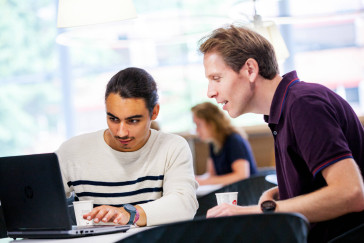On March 9th and 10th Zac Woolfitt attended the Media and Learning Conference in Brussels. The programme of this annual conference examines ‘developments, services and uses of media in education and training to […] identify policies and initiatives that promote digital and media competence at all levels of education and training as well as to promote best-practice in the take-up and application of media in education and training.’
DOCUMENT

Videos of the opening and keynote presentation, the panel discussion and the CIE aftermovie.
MULTIFILE

In June 2019, the fourth conference of the Foundation for Auditing Research (FAR) has been held. The theme of the conference was ‘Evidence informed policy making for the future of the auditing profession’. Professor Willem Buijink (Open Universiteit and FAR Academic Board member) chaired nine plenary sessions, spread over two days. In this article, the focus will be on the keynote speeches by Robert Knechel (University of Florida and Academic Board Member of FAR) and Miguel Minutti-Meza (University of Miami) and on the panel discussion regarding the theme of the conference.
LINK
The denim industry faces many complex sustainability challenges and has been especially criticized for its polluting and hazardous production practices. Reducing resource use of water, chemicals and energy and changing denim production practices calls for collaboration between various stakeholders, including competing denim brands. There is great benefit in combining denim brands’ resources and knowledge so that commonly defined standards and benchmarks are developed and realized on a scale that matters. Collaboration however, and especially between competitors, is highly complex and prone to fail. This project brings leading denim brands together to collectively take initial steps towards improving the ecological sustainability impact of denim production, particularly by establishing measurements, benchmarks and standards for resource use (e.g. chemicals, water, energy) and creating best practices for effective collaboration. The central research question of our project is: How do denim brands effectively collaborate together to create common, industry standards on resource use and benchmarks for improved ecological sustainability in denim production? To answer this question, we will use a mixed-method, action research approach. The project’s research setting is the Amsterdam Metropolitan Area (MRA), which has a strong denim cluster and is home to many international denim brands and start-ups.
Studenten in het beroepsonderwijs leren op de werkplek om een goede beroepsuitoefenaar te worden. Beoordeling van het werkplekleren gebeurt vaak op de werkplek en door de werkplek. Dit promotieonderzoek wil in kaart brengen hoe werkplekopleiders de student beoordelen.

“Empowering learners to create a sustainable future” This is the mission of Centre of Expertise Mission-Zero at The Hague University of Applied Sciences (THUAS). The postdoc candidate will expand the existing knowledge on biomimicry, which she teaches and researches, as a strategy to fulfil the mission of Mission-Zero. We know when tackling a design challenge, teams have difficulties sifting through the mass of information they encounter. The candidate aims to recognize the value of systematic biomimicry, leading the way towards the ecosystems services we need tomorrow (Pedersen Zari, 2017). Globally, biomimicry demonstrates strategies contributing to solving global challenges such as Urban Heat Islands (UHI) and human interferences, rethinking how climate and circular challenges are approached. Examples like Eastgate building (Pearce, 2016) have demonstrated successes in the field. While biomimicry offers guidelines and methodology, there is insufficient research on complex problem solving that systems-thinking requires. Our research question: Which factors are needed to help (novice) professionals initiate systems-thinking methods as part of their strategy? A solution should enable them to approach challenges in a systems-thinking manner just like nature does, to regenerate and resume projects. Our focus lies with challenges in two industries with many unsustainable practices and where a sizeable impact is possible: the built environment (Circularity Gap, 2021) and fashion (Joung, 2014). Mission Zero has identified a high demand for Biomimicry in these industries. This critical approach: 1) studies existing biomimetic tools, testing and defining gaps; 2) identifies needs of educators and professionals during and after an inter-disciplinary minor at The Hague University; and, 3) translates findings into shareable best practices through publications of results. Findings will be implemented into tangible engaging tools for educational and professional settings. Knowledge will be inclusive and disseminated to large audiences by focusing on communication through social media and intervention conferences.